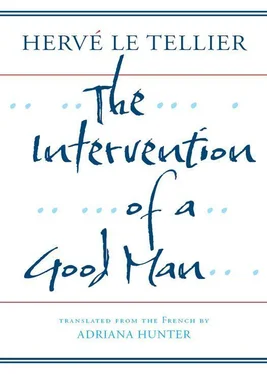Let’s laugh instead: from the Paris airport, our hero has also contacted his hotel to let them know about the delay. A kindly Scotsman — a warmly dressed redhead with alopecia, waiting to catch the same flight — overheard his administrative conversation. He starts talking to our hero, who looks him up and down in amazement. My God, I bet this guy’s the same age as me, he shudders. He wonders how, in all honesty, he could be sure of looking any younger.
As friendly as you please, the man tells him the best way to get to the town he referred to. He goes so far as to say the hotel in question is magnificent. And finishes with a You’re lucky to be spending a night there. Our hero thinks that, in actual fact, this night will be spent alone, and he will leave the hotel when the time comes to check out without having been joined by the young woman. Still, he thanks the kindly Scotsman as best he can.
But four stars for one man on his own is a lot less fun than two stars for two people.

The kindliness of fate. In which our hero, in
the face of adversity, rallies himself .
In the end, it is almost eight o’clock in the evening when the DC-10 deigns to alight on Scottish soil, not before the airline (whom we will not name and shame) has stuffed its occupants with filthy paninis, unblushingly billed at five euros apiece. Our hero, the first to emerge from the baggage hall — precisely because he has no baggage — rushes over to the Avis Car Rental desk, picks up his keys, runs to find the car, lobs his bag into the trunk, opens the door, and sits inanely in the passenger seat, this, of course, being a British car. No witnesses to the procedure, by good fortune. Facing this absence of a steering wheel, in the passenger seat of a foreign sedan, stationary and driverless, it occurs to him that this is a remarkable allegory for his own amorous situation.
A long hour’s drive spent changing gear with his left hand, a phone call that was as pointless as it was depressing — Tomorrow would be better, she reiterated — and now here he is at his hotel in a state of unusual physical and emotional exhaustion. But fate has a way of playing an elegant hand: the place is as ugly as could be, and this fact is not without its jubilant compensation, so utterly inappropriate would it be to spend a night of passion here. The Braemore Great Southern Hotel is a building with about a dozen rooms, marshmallow-style lighting, long corridors, and ugly carpeting with a leafy, gilded, cross-hatched design on a black background. It would be no surprise to meet the blond twins from The Shining at the end of a corridor, and streams of blood could easily spring from the elevator shaft. In the lobby, Maria Callas is singing from La forza del destino , but who is taken in by that? His room is vast, the bed equally so, and our hero promises himself to sleep across it, in order to reap the best return on his investment.
He also congratulates himself for deciding to keep a diary of his misadventures — he dare not think in terms of “adventure.” This sort of work in progress means he can sustain an illusion that his being here is not entirely without purpose, but surely illusions are the driving force behind his situation? His love of the aesthetic and the absurd are both amply gratified. This is going to need footnotes, he thinks. He will write those later, perhaps.
It has been agreed that he will call the heroine in the morning, at ten o’clock. He has already prepared what he will say, asking her to forgive him for being so pushy this evening, which was probably because he was tired of waiting. He will be a new man, he promises himself he will.
But is a restorative night even possible in the peculiar state in which our hero finds himself? And will everything seem better in the morning?
No.
The night does not improve anything. Besides, our hero dreams.
He follows her a long way, a long, long way, to a hotel beside the sea which probably does not exist anywhere in the world. The place, for readers who might know Chris Marker’s film, is like the hotel in The Jetty. O thers will have to imagine an empty modern building, lots of concrete and not much glass, almost a blockhouse, standing in the middle of a felled pinewood, beneath gray clouds stretching to a gloomy horizon. Our heroine is with the Other on a wide beach full of dirty, lumpy pebbles, and dozens of people who have come to the seaside only to cart their boredom somewhere new. It is October weather, windless. Our hero walks down a path and goes over to them. She sees him. He cannot remember what the Other looks like in real life but here, in the dream, he does not visualize him, and it does not matter. They are busy writing postcards to mutual friends. They say names and surnames. He does not recognize any of them. This very ignorance is painful to him. There are two sky blue air mattresses beside them, they can only be theirs. The hero lies down on one. She is only three feet away. Despite the fact that the Other is there, she seems completely unself-conscious, as does our hero. He looks over toward the sea, people swimming, watches her too, but his nonchalant gaze is intended to make the Other think she is merely part of the scenery.
She and the Other have discussions about whom they really must send postcards to. There is a strong sense that a lot is at stake in these decisions, a disproportionate amount. She does the writing, he is happy just to sign. All at once, our heroine turns to our hero and says something innocuous, to do with stamps. She should be speaking to him as a stranger but she lays her hand on his shoulder. She has just made a blunder, he can see by the look in her eye, but the Other does not react, he looks at him and suddenly he takes shape, it is ridiculous, in real life this Other has a fairly ordinary physique and no depth, but in the dream he is peerlessly magisterial. Our hero sees something of Beckett in him, and of Terence Stamp too, the lie of his hair, or the suit he is wearing, black, double-breasted, beautifully cut, utterly inappropriate for the beach. The Other seems convinced he knows him. Our hero simply replies, “No, I don’t think so.” He stands up and leaves. Without looking back.
He is at the hotel again, and it is now like a hotel in Moscow, on a gigantic scale with strong geometric lines and a central staircase around which the rooms are arranged. There is nothing comfortable about his room, and this too has a Soviet air, it is vast, with an odd layout, the sink halfway along one wall, the carpet bald. A room no one could ever feel right in. He wishes she would join him there, but also wishes he were somewhere else, anywhere, but not here. It is very hot. He lies down on the bed. The sheets are untidy, the covers crumpled, he has never slept in it, this mess is from the previous occupants. Damn, he feels depressed.
Our heroine opens the door to the room, says his name, unenthusiastically. And our hero then feels so sad and his sadness is so piercing that he wakes up.

In which our hero rereads and corrects his notes .
In which he prepares for the worst and also the best .
Daylight peeps through the skimpy curtains. His cell phone blinkingly indicates it is three minutes past six in the morning. Our hero wakes, exhausted, after too short a night. Quite unable to get back to sleep, he sits on the bed, switches on his laptop, and reworks the few notes he made. A reader (a woman reader comes to mind more readily but it could just as well be a man) would be wrong to think that this new text was less sincere than the first draft, from which it differs only in small details. In fact the opposite is true: there, on his keyboard, our hero hones his thoughts, adjusting words to try to capture his feelings as accurately as possible. His sentences also expel the tragic element, and he is not displeased by the redeeming role he makes them play. If our hero had any recollection of things he read long ago, he would know that, in his Poetics , Aristotle ascribed the word “catharsis” to this purging of passions through practicing an art form.
Читать дальше














